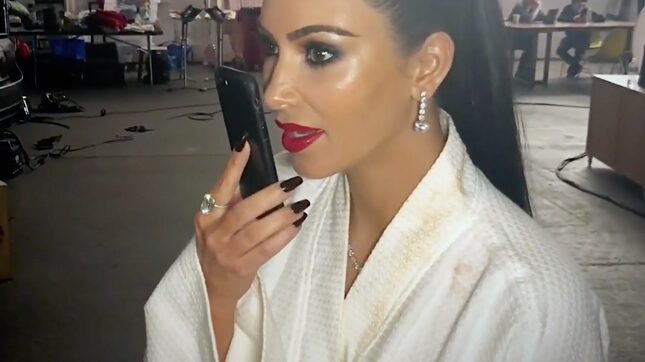

In a confessional on Kim Kardashian West: The Justice Project, while discussing David Sheppard’s unfair sentencing, West muses: “I understand that somebody who is involved in something should get time.” Her point, ultimately, is that people who are simply accessories to crimes shouldn’t be charged with longer and stricter sentences than the perpetrators of the crime itself. To West, it’s not that prisons and the sentencing system that bloats them past capacity should stop existing—a political platform with which any modern prison abolitionist would wholeheartedly agree. So what exactly is West fighting for?
Kim Kardashian West: The Justice Project premiered on Oxygen on Sunday night to relatively little fanfare, and it raised more questions than it answered. The two-hour documentary covers a breadth of Kim Kardashian West’s antics in the past few years, from helping Alice Johnson and the aforementioned David Sheppard get released from prison to her work with Cut50, which she partnered with after choosing to pursue criminal justice work. But if you’re looking for a deep analysis of the many ways our prison system has utterly ruined the lives of incarcerated people, pushing profit-driven sentencing regulations designed to punish the innocent and inflict deep, long-lasting traumas, then you should probably look elsewhere. In fact, The Justice Project isn’t even explicitly anti-prison, an expectable outcome when pioneered by West. At one point, she’s called “one of the leading voices in criminal justice reform.” In the next she admits: “I don’t know much.”
Throughout the documentary, a handful of cases that West has involved herself with are interspersed with cutaways of her Cut50 lawyers discussing their heartbreak, as well as shoe-horned dramatic re-enactments of things like sexual assault and murder. Confessionals from each trial are also appended by interviews with the friends and family of the incarcerated explaining the events surrounding the case, and in some instances, the incarcerated themselves. Moments like these, when people like Alice Johnson, Cyntoia Brown, or Dawn Jackson, are allowed to speak, are among the most moving of The Justice Project. But they also ask the victims at the center of the prison industrial complex, largely black Americans, to bare their traumas for the audience with no tangible solutions offered, save the glaringly bright light of the celebrity at the documentary’s center.
While inarguably focused on the stories of the incarcerated, the cameras of Kim Kardashian West: The Justice Project tend to stray back to the woman for whom the project is named after. Take the moment when Alice Johnson receives the news she will finally be free from prison, the case that first put West’s activist work in the public attention. Johnson’s mixture of grief, shock, and relief drove me to tears while watching it. But it was hard to ignore that when she made the call herself, West was in the middle of getting her makeup done, cloaked in a bathrobe smeared in foundation and self-tanner. Sure, this is her documentary, and it features her work fighting to free the men and women whose lives she’s been able to affect change through. But when a picture of West, posed beside a grinning President Trump, briefly flashes across the screen, the moment is stripped of its context. Her own husband’s perplexing relationship with the president is ignored, as is her ties to Ivanka Trump and Jared Kushner, who themselves are involved—both politically and through familial ties—to the violent mass incarceration of immigrants at the U.S. border. During interviews both during and after her multiple engagements at the White House, West has claimed that she was not used by Trump—she used him. But the shallow, toothless politics offered up in The Justice Project telegraph the exact opposite.
Throughout the documentary, West is simply a benevolent hero, afforded by her grace and celebrity stature to change the lives of the wanting, reformed, and innocent. But that is also wholly untrue, regardless of whether West has come to see her involvement with the White House for what it was—a tool with which Trump could bludgeon supporters and the media. (Ignoring, completely, those many tortured and imprisoned immigrant people still held captive at our border.) Worse, the documentary does more than strip away the politics of her involvement with Trump, it strips away any contextual analysis of prisons at all. Viewers have our hands held as West, the documentarians, Cut50, and lawyers do their best to never tread too far into the specifics of why the prison system is “bad” or “unfair,” words thrown around quite a bit over its 120 minutes.
Instead of naming the policies that overwhelmingly brutalize black men and women both inside and out prison system—structural racism, rampant policing, the militarization of the surveillance, a white supremacist capitalist government system—West’s analysis often boils down to: “Prisons should exist, but this is so sad.” She says this quite clearly when musing on David Sheppard’s case, telling viewers: “I understand that somebody who is involved in something should get time.” Why she “understands” this and what that “time” should entail are never explained. But from the rest of the documentary, it sounds an awful lot like prison, which West is supposedly fighting against. Perhaps then, she should study more textbooks before wading back into the White House or courtrooms, lest she inflict the same harms she has so tirelessly worked to undo.